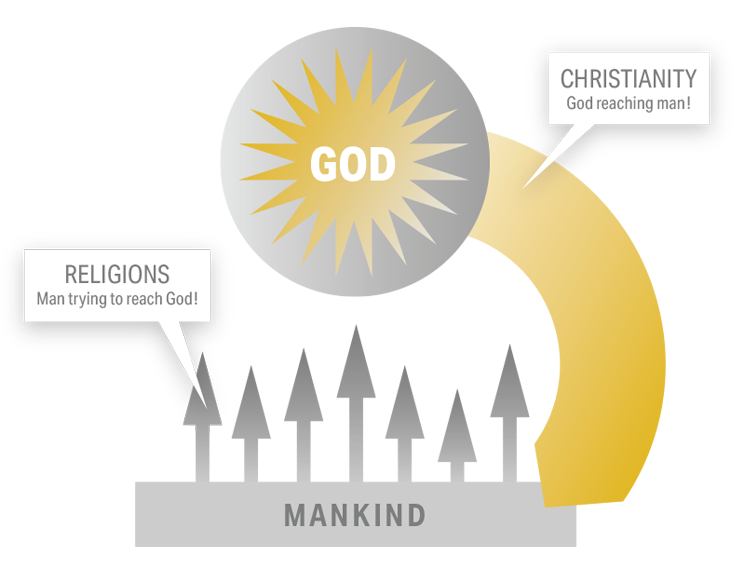‘GOSPEL’ IS A CHRISTIAN ONE-WORD SUMMARY
The word ‘gospel’ is the English translation of the Greek word ‘evangelion,’ which means ‘good news.’ From this Greek root we also get the word ‘evangelize,’ meaning to tell the gospel to others.
Gospel is a short-hand expression – a communications handle – which conveys great meaning to those who understand the profound spiritual facts which the word embraces. In Christian terminology, the word means the good news of what God will do for us personally – if we ask him – through Jesus Christ.
The Gospel first burst upon the world nearly 2,000 years ago and changed the course of history. It’s been distorted, misunderstood and often buried under layers of church tradition; but it’s still as relevant and powerful as ever. The purpose of this resource is to help people discover the gospel.
In simple language, this is the Gospel (aka/the ‘Good News’)
- Your sins can be forgiven!
- You could have God (Holy Spirit) in your life now!
- You can experience God’s presence (heaven) rather than his absence (hell) forever!
- This offer is a FREE gift!
THE GOSPEL IS THE MOST AMAZING OFFER EVER MADE
The Good News – the Gospel – is that we can live a happy life now... that we won’t go to hell... and that there’s no cost to us! It’s no wonder that people who know the gospel get so excited about it.
The Gospel is the most amazing offer ever made – surpassing the benefits of all the world’s best products and services – and it’s free and immediately available. Only God could make such an offer!
As with most of God’s ideas, a normal first reaction is that it’s too incredulous to take seriously. But upon further reflection, we realize that God works that way, in both physical and spiritual realms, with designs and plans so spectacular that they barely touch the threshold of our comprehension.
THE GOSPEL REQUIRES A PERSONAL RESPONSE
The Bible says that the benefit of the Gospel – a personal relationship with God forever – cannot be earned, purchased or demanded. The Bible says it’s a free gift offered to everyone, even though not everyone will accept it. As with any gift, it becomes ours only when we receive it according to the giver’s terms.
God gave us the Gospel as something to respond to; something to give us personal interaction with him. Believing and accepting the Gospel is the way we show love and gratitude to God. Rejecting the gospel is the way we tell him we don’t need him and want him to leave us alone.
The Gospel is highly personal and practical, determining our happiness and eternal destiny. Important aspects of the Gospel are examined in detail in Topics 53-66.
Now there’s a new and better way of living
Not what we do.

The OLD WAY – trying hard to be good – is how life is without a personal relationship with Jesus Christ. It’s the way of all religions, even the way of cultural Christianity (see Topic 11). It’s admirable, but very difficult. It usually results in many rules and disciplines. But, even at best, no one can be consistently good enough to be worthy of heaven.
But what we get.

The NEW WAY – having a new life with God inside – doesn’t depend upon doing good deeds. It’s based on a relationship with God, not performance for God. It’s a new lifestyle, but much more... it’s a new life!
People who haven’t personally experienced this new life have difficulty believing it at first because it sounds too good to be true, but it can be confirmed through personal investigation (see Topic 62).
Here's a sampling of what the Bible says on this subject.
Romans 3:21-28
Not saved by good things we do
I Corinthians 15:2
Saved by the gospel
II Corinthians 5:17-21
It’s a whole new life
For help, see Topic 29.


 The common notion, even among many who regard themselves as Christians, is that if there’s a preponderance of good deeds in a person’s life, he’ll go to heaven... and if there’s a preponderance of bad deeds he’ll go to hell.
The common notion, even among many who regard themselves as Christians, is that if there’s a preponderance of good deeds in a person’s life, he’ll go to heaven... and if there’s a preponderance of bad deeds he’ll go to hell.

 Justice is closely related to holiness and love rather than being a contrasting principle. When there are many things sharing common time and space – whether atoms in molecular orbit or people in a city – laws are needed to prevent chaos. Good laws are motivated by love, for the benefit of all.
Justice is closely related to holiness and love rather than being a contrasting principle. When there are many things sharing common time and space – whether atoms in molecular orbit or people in a city – laws are needed to prevent chaos. Good laws are motivated by love, for the benefit of all.
 The Bible says that God has a deep and tender feeling of affection and attachment for each of us, and he has an enduring concern for our individual well-being.
The Bible says that God has a deep and tender feeling of affection and attachment for each of us, and he has an enduring concern for our individual well-being. This agape kind of love means much more than warm feelings. It means thoroughly enjoying a deep and intimate relationship and giving unselfishly in practical ways to meet the needs of the loved one.
This agape kind of love means much more than warm feelings. It means thoroughly enjoying a deep and intimate relationship and giving unselfishly in practical ways to meet the needs of the loved one.
 By observing the universe, we see that God operates by intricate principles and meticulous order – we call them laws (rules governing the relationship of things). The Bible says that God conducts his world according to physical laws and spiritual laws.
By observing the universe, we see that God operates by intricate principles and meticulous order – we call them laws (rules governing the relationship of things). The Bible says that God conducts his world according to physical laws and spiritual laws.




